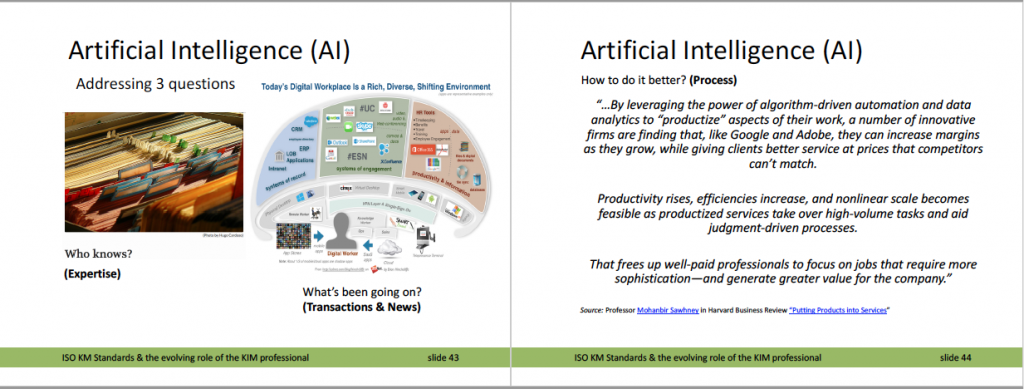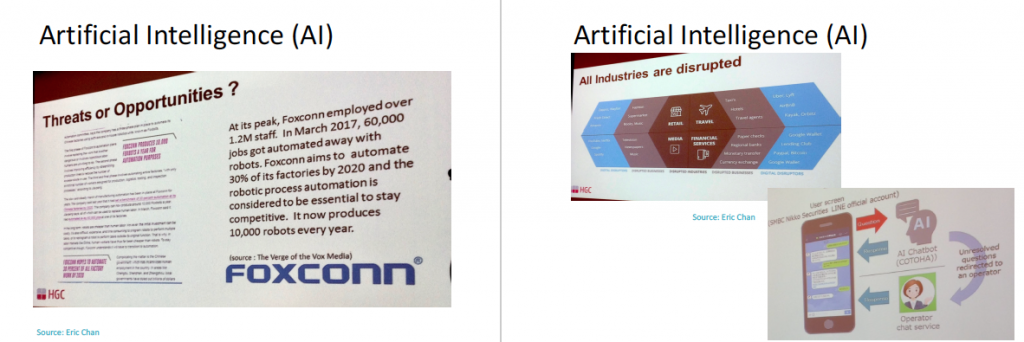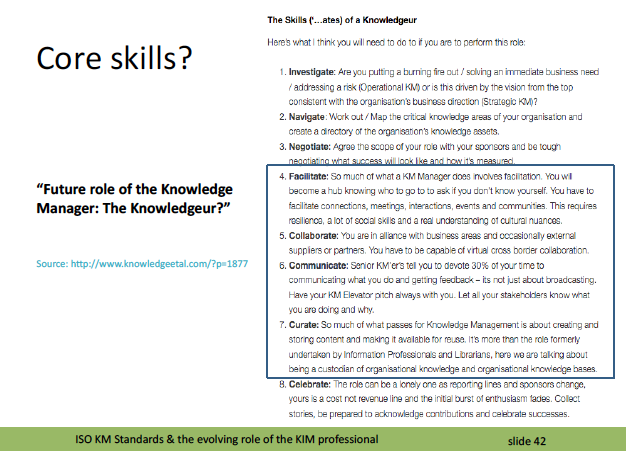I’m lucky. I get to travel to some of the most interesting places on the planet and experience different cultures. These last few weeks for example I’ve been on a book / Masterclass / conference trip to Hong Kong, Kuala Lumpur and SIngapore.
More on the issues that arose around KIM accreditation and the outcomes from KM Asia in separate blogs.
Over dinner in Hong Kong I got to talk about “Sophia” the locally based Hanson Robotics model that controversially has been given citizenship of Saudi Arabia. While hugely impressive and a major advance in sensory technology two quotes about Sophia stuck with me:
Why are we humans obsessed with creating life forms in our own image?” and
“Dogs are able to sense what their master’s mood is. Imagine if we could replicate that in Sophia?”
“Km has gone thru peak of inflated expectations which AI is now going thru”
This was one of KM Asia’s Day Two Chair Les Hales opening remarks.
It’s a good backdrop to focus on the ever increasing clamour I sense around the use of AI / machine learning technology to improve effiiciency and outcomes, reduce headcount +/or free up time for more added value work. In the Masterclasses and presentations I suggested AI is addressing 3 questions on expertise, transactions / news and process:
 I noted there has been a lot more in the way of measurable progress on transactions / news and process enhancement than on expertise. In his presentation at KM Asia, Eric Chan of Hutchinson Global Communications showed examples of a couple of regionally based organisations who now used Chat Bots
I noted there has been a lot more in the way of measurable progress on transactions / news and process enhancement than on expertise. In his presentation at KM Asia, Eric Chan of Hutchinson Global Communications showed examples of a couple of regionally based organisations who now used Chat Bots
 His examples above which focused on the process question confirmed the widely held assumption that many industries are ripe for disintermediation by AI technology. I noted a couple of his comments:
His examples above which focused on the process question confirmed the widely held assumption that many industries are ripe for disintermediation by AI technology. I noted a couple of his comments:
“Replacing customer service agents by chatbots powered by AI. Achieves 9/10 satisfaction and not subject to selective memory and
1/3rd of work can be done by machines = disruptive stress”
What was really interesting about the Chatbot example? How the difficult customers (the ones who shout) get routed thru to a human!
So where does this leave Knowledge & Information Management? Actually not badly if Eric Hunter’s comment is to be believed:
“The rise of newer forms of technology is challenging the way codified knowledge is managed leading to the need for KM professionals to work with new types of colleagues such as business process improvement specialists and AI providers.”
Note the use of the phrase to work with not be replaced by. Here’s why I believe this to be the case.
The importance of Curation (…ate #7)
One of many positives to emerge from every stop on my Asian adventure was a reaffirmation of the importance of curation, a term Patricia Eng and I described in our book thus:
#7 Curate: So much of what passes for Knowledge Management is about creating and storing content and making it available for reuse. It’s more than the role formerly undertaken by Information Professionals and Librarians, here we are talking about being a custodian of organisational knowledge and organisational knowledge bases.
Technology has for some time been knocking at this door. Indeed companies like Profinda have made significant strides so it was fascinating to read this very well written piece on Microsoft’s evolving Yammer strategy by Antony Cousins, Director of Customer Success which reflects my ongoing concern that Technology is not Knowledge Management:
Lost knowledge. With the same room structure as Yammer, there will be popular generic rooms where far too much is shared, too little is relevant to users and, should they ever want to find that document or that chat thread which was relevant to them, good luck. It’s lost in the never ending deluge of chat never to be seen again. If we can’t easily find previous answers and solutions or reference points, we’ll be as doomed on Microsoft Teams, as we were on Yammer, to ask the same questions over and over or worse, repeat the same mistakes…. So, in general, well done Microsoft for making things that were quite easy about 6% easier. Now can we please focus on the really big problems still faced by those of us trying to resolve the collaboration problem for big business?
I continue to argue that one of the key aspects of the role of KIM’ers is acting as Curators of organisational knowledge as well as signposts / navigators. In fact this was the premise behind my Masterclasses in Singapore and Kuala Lumpur and the need for those skills:
 KIM’ers have to be good at understanding technology and its implications for the business. But they are one of the few groups organisationally who see across silos and should be able to analyse business needs!
KIM’ers have to be good at understanding technology and its implications for the business. But they are one of the few groups organisationally who see across silos and should be able to analyse business needs!
And finally
My concern is that organisations increeasingly see technology in its new guise as KM and are jumpiing on the bandwagon to put social tools behind the firewall expecting staff to find the expertise / historical knowledge automatically. In previous pieces I’ve argued that assisted search is still important.
I can also see a shift towards HR / Talent Management as the logical resting place for the discipline where the driver is one of mitigating the risk of knowledge loss when people leave.
But I still see in the short to medium term at least a need for what good KIM’ers do.

